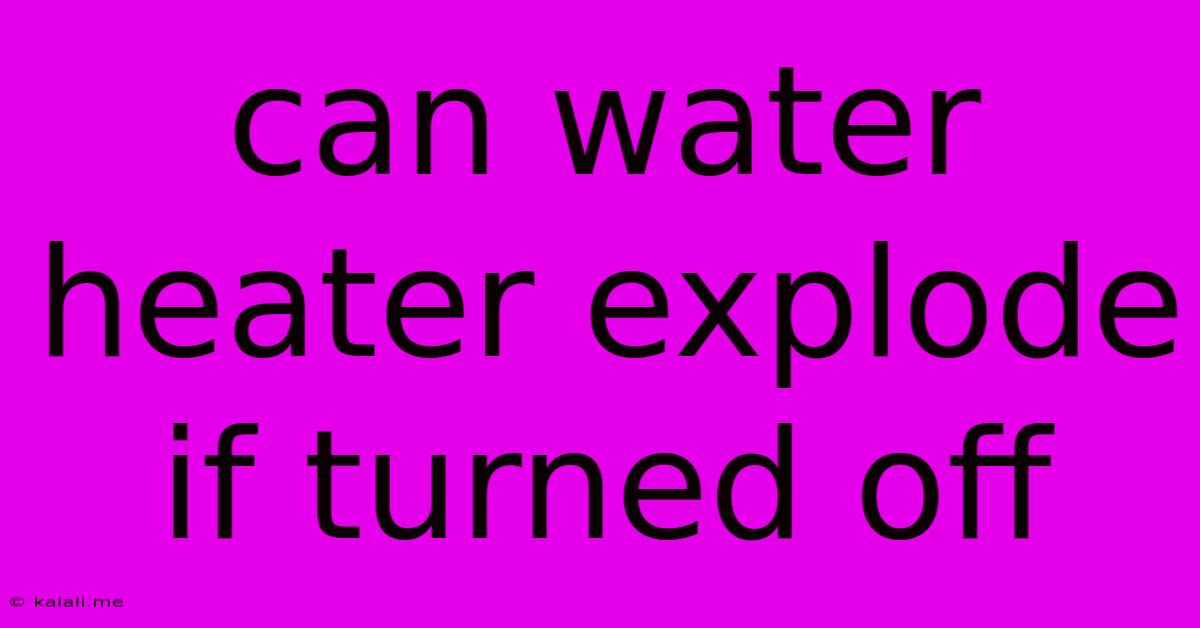Can Water Heater Explode If Turned Off
Kalali
May 25, 2025 · 3 min read

Table of Contents
Can a Water Heater Explode if Turned Off? Understanding the Risks
A common question among homeowners revolves around the safety of their water heaters, especially when considering the possibility of an explosion. While the image of a water heater exploding might seem dramatic, it's a real risk, and understanding the factors involved is crucial for home safety. This article explores whether a water heater can explode even when turned off, the reasons behind such incidents, and what preventative measures you can take.
The short answer is: yes, a water heater can explode even when turned off, although it's less likely than when it's in operation. The primary cause isn't the act of turning it off itself, but rather pre-existing conditions and potential hazards within the tank.
Understanding the Explosion Mechanisms
Water heater explosions typically stem from a buildup of pressure within the tank. This pressure can exceed the tank's capacity, leading to a rupture. Several factors contribute to this pressure increase, even when the unit is switched off:
-
T-P Relief Valve Failure: The temperature and pressure (T-P) relief valve is a crucial safety device designed to release excess pressure and prevent explosions. If this valve malfunctions, becomes clogged (due to mineral deposits or sediment buildup), or is simply worn out, it cannot perform its function, leading to a dangerous pressure buildup. This is a major contributing factor regardless of whether the heater is on or off.
-
Corrosion and Tank Degradation: Over time, water heaters, especially older models, experience internal corrosion. This corrosion weakens the tank's structure, making it more susceptible to rupture under pressure. This gradual weakening can lead to an explosion even without the heater being actively heated. Sediment buildup further exacerbates this problem.
-
External Damage: Physical damage to the water heater tank, such as a significant dent or crack, can compromise its structural integrity, leaving it vulnerable to failure under pressure. This can happen regardless of operational status.
-
Frozen Water: In extremely cold climates, water within the tank can freeze and expand, exerting immense pressure on the tank walls. This expansion can crack the tank, potentially leading to an explosion, even if the unit is turned off. This is more likely in situations where the water heater is improperly insulated or located in an unheated space.
Reducing the Risk of Explosion
While you can't completely eliminate the risk, several steps can significantly reduce the chances of a water heater explosion:
-
Regular Inspection and Maintenance: Schedule annual inspections by a qualified professional. They can check the T-P relief valve, inspect for corrosion, and assess the overall condition of the tank.
-
Flush the Tank Regularly: Sediment buildup can contribute to corrosion and valve malfunction. Regular flushing helps remove these deposits, prolonging the lifespan and safety of your water heater.
-
Proper Installation: Ensure your water heater is installed correctly by a licensed plumber. Improper installation can contribute to various safety issues, including pressure imbalances.
-
Address Leaks Promptly: Any leaks, no matter how small, should be addressed immediately. A small leak can indicate a weakening in the tank, increasing the risk of eventual failure.
-
Insulation in Cold Climates: If you live in a region with freezing temperatures, ensure your water heater is properly insulated to prevent water from freezing and expanding within the tank.
-
Know the Signs: Be aware of signs of potential trouble, such as unusual noises, leaking water, or a sudden drop in hot water pressure. Contact a professional immediately if you notice any of these.
In conclusion, although less probable, a water heater can still explode even when turned off. Proactive maintenance, regular inspections, and awareness of potential risks are key to ensuring the safety of your home and family. Remember, prevention is always better than cure when it comes to water heater safety.
Latest Posts
Latest Posts
-
How To Fix A Zipper On A Backpack
May 26, 2025
-
How To Level Up Fast In Rpgs
May 26, 2025
-
Transfer Learning Vs Few Shot Learning
May 26, 2025
-
Macbook Pro 2019 Touch Bar Flashes
May 26, 2025
-
Is The Book Of Enoch In The Catholic Bible
May 26, 2025
Related Post
Thank you for visiting our website which covers about Can Water Heater Explode If Turned Off . We hope the information provided has been useful to you. Feel free to contact us if you have any questions or need further assistance. See you next time and don't miss to bookmark.